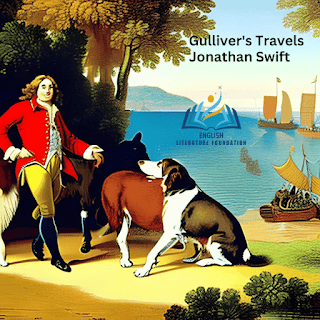"A Fantastical Journey Through Gulliver's Travels"
Part II: A Voyage to Brobdingnag
1. From Lilliput to Brobdingnag
After his eventful stay in Lilliput, Gulliver embarks on a
new voyage that takes him to the land of Brobdingnag. In stark contrast to the
Lilliputians, the Brobdingnagians are giants, towering over Gulliver and
presenting a completely different set of challenges and adventures.
2. The Marvels and Perils of Giants
Swift skillfully portrays the awe-inspiring scale and
physicality of the Brobdingnagians. Gulliver's encounters with the enormous
inhabitants of Brobdingnag emphasize his vulnerability and insignificance in
their presence. The immense size of everything, from the landscape to the
creatures, showcases the magnificence and potential dangers of a world
dominated by giants.
3. Lessons in Humility
As Gulliver navigates the giant society of Brobdingnag, he
is confronted with his own insignificance and flaws. The Brobdingnagians, with
their keen observations and critical insights, serve as a mirror for Gulliver's
own shortcomings. Through their honest and often brutal assessments, Swift
highlights the importance of humility and self-reflection in the face of human
imperfections.
4. Satirical Critique of Human Society
Swift's satire continues to shine in Brobdingnag as he uses
the giant society to expose the flaws and absurdities of human civilization.
The Brobdingnagians, despite their physical superiority, possess their own set
of shortcomings and follies. Through their conversations and interactions with
Gulliver, Swift critiques various aspects of human society, including politics,
religion, and science, highlighting the flaws and dangers that exist within
each.
5. A Different Perspective on Human Nature
Through his encounters with the Brobdingnagians, Gulliver
gains a new perspective on human nature. The giant society's emphasis on
reason, honesty, and practicality challenges Gulliver's preconceived notions
and forces him to reevaluate his own beliefs and values. Swift prompts readers to
question their own assumptions and biases, encouraging a deeper understanding
of the complexities of human behaviour.
6. Vulnerability and Danger
Gulliver's vulnerability in the land of Brobdingnag is a
recurring theme throughout his journey. The giant creatures that inhabit the
land pose significant risks to Gulliver's safety, highlighting the
precariousness of his situation. Swift adeptly uses Gulliver's encounters with
various hazards to underscore the fragility of human existence and the constant
presence of danger in the world.
7. Social Criticism through Contrasts
Swift employs stark contrasts between the Lilliputians and
the Brobdingnagians to heighten his social criticism. The flaws and vices of
one society are juxtaposed against the virtues and ideals of the other. Through
these sharp contrasts, Swift comments on the relativity of societal norms and
values, challenging readers to critically examine their own societies and
question the prevailing beliefs and practices.
8. Reflections on Power and Perspective
Gulliver's experiences in Brobdingnag prompt him to reflect
on the nature of power and the impact of perspective. As a small being in a
land of giants, Gulliver gains insights into the abuse and misuse of power, as
well as the limitations of his own perspective. Swift encourages readers to
consider the ethical implications of power dynamics and to recognize the
importance of diverse viewpoints in fostering a just and balanced society.
9. A Journey of Self-Discovery (continued)
of external lands but also a journey of self-discovery. As
Gulliver encounters the giants of Brobdingnag and navigates their society, he
is forced to confront his own prejudices, biases, and limitations. Through his
interactions with the Brobdingnagians, Gulliver gains a deeper understanding of
himself and undergoes personal growth, challenging his preconceived notions and
expanding his perspective on the world.
10. Appreciation for the Beauty of Humanity
Despite the flaws and imperfections displayed by the
Brobdingnagians, Gulliver develops a newfound appreciation for the beauty and
virtues of humanity. The stark contrast between the giant society and his own
human nature highlights the unique qualities and potential for goodness that
exist within individuals. Swift's portrayal of the Brobdingnagians serves as a
reminder of the value and dignity inherent in the human experience.
In the second part of "Gulliver's Travels," Swift
takes readers on a voyage to Brobdingnag, a land of giants. Through Gulliver's
encounters with the Brobdingnagians, Swift continues his satirical critique of
human society, challenging prevailing norms and highlighting the flaws and
virtues that exist within. The journey to Brobdingnag becomes a transformative
experience for Gulliver as he confronts his own limitations and gains a deeper
understanding of human nature. Swift's insightful social commentary and sharp
satire make the second part of "Gulliver's Travels" a
thought-provoking exploration of power, perspective, and the complexities of
the human condition.
Part III: A Voyage to Laputa, Balnibarbi, Luggnagg, Glubbdubdrib, and Japan
1. Laputa: The Floating Island of Intellectuals
In this part of Gulliver's journey, he visits Laputa, a
floating island inhabited by intellectuals who are detached from the
practicalities of life. Swift satirizes the obsession with theoretical
knowledge and the disconnect between intellectual pursuits and the realities of
the world. Gulliver's encounters with the eccentric Laputians and their
peculiar scientific experiments offer a critique of academia and its potential
for detachment from practicality.
2. Balnibarbi: The Absurdity of Bureaucracy
Gulliver's visit to Balnibarbi introduces him to a land governed
by a bureaucratic system plagued by inefficiency, corruption, and absurd
regulations. Swift's satire exposes the arbitrary nature of bureaucracy and its
tendency to stifle progress and innovation. Through his experiences in
Balnibarbi, Gulliver witnesses the detrimental effects of excessive bureaucracy
on society and the absurd lengths to which it can go.
3. Luggnagg: Immortality and Its Consequences
In Luggnagg, Gulliver encounters the Struldbrugs, a group of
individuals who are cursed with immortality but not eternal youth. Swift uses
the Struldbrugs to explore the darker side of immortality, highlighting the
loneliness, despair, and societal marginalization that accompany eternal life
without vitality. Through Gulliver's interactions with the Struldbrugs, Swift
raises questions about the nature of human existence and the limitations of
immortality.
4. Glubbdubdrib: Conversations with the Dead
During his time in Glubbdubdrib, Gulliver is granted the
ability to converse with historical figures and the deceased. Swift uses this
fantastical element to engage in dialogues with figures from the past, allowing
Gulliver to gain insights into history, philosophy, and the flaws of humanity.
Through these conversations, Swift delves into the moral and intellectual
dilemmas faced by individuals throughout history, providing a platform for
critical reflection on the human condition.
5. Japan: A Glimpse of Balance and Harmony
Gulliver's final destination in Part III is Japan, a country
that stands in stark contrast to the other lands he has visited. Swift presents
Japan as a harmonious society with a balanced approach to life, where virtue,
moderation, and cultural traditions are valued. In contrast to the satirical
tone of the previous destinations, Japan represents a respite and offers a
glimpse of a more enlightened and balanced society.
Part III of "Gulliver's Travels" takes readers on
a multi-faceted journey through Laputa, Balnibarbi, Luggnagg, Glubbdubdrib, and
Japan. Swift's satire continues to be a prominent feature as he critiques
academia, bureaucracy, immortality, and engages in philosophical conversations
with historical figures. The contrasting destinations offer a diverse range of
social, cultural, and philosophical commentary, providing readers with a thought-provoking
exploration of human follies, societal systems, and the pursuit of knowledge.
Swift's masterful storytelling and biting satire make Part III an intriguing
and intellectually stimulating continuation of Gulliver's extraordinary
adventures.
Part IV: A Voyage to the Country of the Houyhnhnms
1. Arrival in the Land of the Houyhnhnms
In this final part of Gulliver's travels, he arrives in the
country of the Houyhnhnms, a society of rational and highly intelligent horses.
Swift uses the Houyhnhnms to contrast with human society, presenting them as a
morally superior species that values reason, virtue, and harmony.
2. The Yahoos: A Reflection of Human Nature
Gulliver's encounters with the Yahoos, a primitive and
bestial humanoid species, serve as a mirror to reflect the flaws and
shortcomings of humanity. Swift satirizes human nature through the repulsive
and irrational behavior of the Yahoos, highlighting the base instincts, vices,
and follies that humans are capable of.
3. The Houyhnhnms' Ideal Society
Swift presents the Houyhnhnms' society as an idealized
version of human society, free from corruption, greed, and deceit. The
rationality, harmony, and moral integrity of the Houyhnhnms stand in stark
contrast to the degenerate behavior of the Yahoos. Through this contrast, Swift
raises questions about the true nature of humanity and the possibility of
achieving an ideal society.
4. Gulliver's Self-Reflection
As Gulliver spends more time with the Houyhnhnms, he begins
to question his own identity and his place in the world. He starts to see
himself as a Yahoo, recognizing the flaws and irrationality within himself and
his fellow humans. Gulliver's self-reflection and his admiration for the
virtues of the Houyhnhnms lead him to question the very foundations of his own
society.
5. The Rejection of Humanity
Gulliver becomes disillusioned with humanity and develops a
deep admiration for the Houyhnhnms. He becomes repulsed by human society and
longs to live among the rational and virtuous horses. Swift uses Gulliver's
rejection of his own kind to convey a scathing critique of the flaws and
inherent vices of human nature.
6. The Limits of Rationality
Despite the apparent perfection of the Houyhnhnms, Swift
suggests that their exclusive reliance on reason and rationality may have its
limitations. Gulliver discovers that the Houyhnhnms lack certain human
qualities such as emotion, art, and imagination. Through this, Swift challenges
the idea that a purely rational society is the ultimate solution for human
progress and happiness.
In the fourth and final part of "Gulliver's
Travels," Swift takes readers on a profound exploration of human nature
and society through Gulliver's encounters with the Houyhnhnms and the Yahoos.
Through the contrasting portrayals of the rational and virtuous horses and the
repulsive and irrational Yahoos, Swift offers a scathing critique of human
society. The Houyhnhnms' idealized society challenges readers to reflect on the
flaws and limitations of their own species, raising fundamental questions about
the nature of humanity and the possibilities of achieving a truly enlightened
and harmonious society. Swift's powerful satire and thought-provoking
commentary make Part IV a compelling and introspective conclusion to Gulliver's
extraordinary travels.

